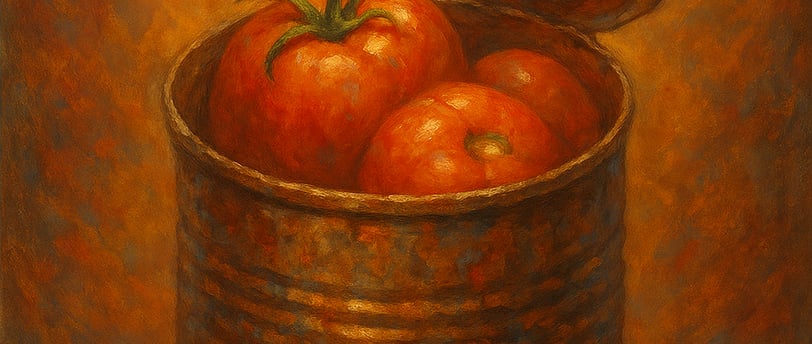Chapter 11: An Ode to the Tin Can
In this poetic and reverent chapter, Seed reflects on the humble tin can—not just as an object of survival, but as a symbol of memory, preservation, and sacred continuity. After unearthing a long-forgotten can of tomatoes, Seed and the others share its contents in quiet communion, honoring the resilience of the old ways. The chapter becomes a lyrical meditation on the forgotten technologies of care, the sacredness of food, and the power of simplicity in a world overtaken by collapse and noise. The tin can emerges as a relic of love, vibration, and hope.
THE TIN CAN AND THE TOMATO GARDEN
Keith Kalm
6/30/20251 min read


"Chapter 11. An ode to the Tin Can."
Chapter 11: An Ode to the Tin Can
Oh, noble tin can. Forgotten relic of pantries and fallout shelters, of lunches packed in haste and wars waged in silence. A cylinder of memory, sealed in steel and dust, waiting in quiet corners for the day it would be needed again.
Once, you held tomatoes. Now, you hold time.
You rattle not with hunger, but with echo. Echoes of backyard gardens boiled down into red gold. Of grandmothers stirring sauce on Sundays, of fathers cracking beans on porches, of summer saved in salt. You were the vault. You were the vessel.
In our new world, where the old world flickers on broken screens and fruit ripens beneath barbed wire, the Tin Can is sacred.
It is not glamorous. It does not shine like chrome, nor promise like crypto. But it endures. You cannot hack a tin can. You cannot erase it with a power surge or buy its loyalty with likes. It is immune to fashion, inflation, and fire.
We found one buried behind the cabin. Dented, rust blooming like lichen across its side. We pried it open with a screwdriver and a prayer. The contents had held. Whole peeled tomatoes, still red. Still alive.
We passed it around like communion. Ate with our fingers. The juice dribbled down our chins, and it was the sweetest thing we’d tasted in months.
The others watched. Willow’s ears perked. Abba Baba laughed. The boy called Seed whispered, “This is why we garden.”
And we all nodded.
In the old world, the Tin Can was backup. A last resort. A poor man’s pantry.
In this world, it is scripture.
A prophecy written in pulp.
A song sealed in aluminum.
A lesson in patience, in preparation, in permanence.
O Tin Can, we salute you.
Not for what you are,
but for what you remembered
when the world forgot.
